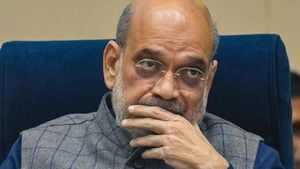President-elect Donald Trump's nomination of Pete Hegseth as secretary of defense has ignited considerable debate surrounding both military policy and Hegseth's controversial views on women's roles within the armed forces. A Fox News personality with limited military experience, Hegseth's nomination is raising eyebrows across the political spectrum.
Now 44 years old, Hegseth, whose career includes serving as a major in the Army National Guard, made headlines with his forceful critiques of female service members. During appearances and in his book, he has expressed clear opposition to women serving in combat roles, stating on the Shawn Ryan Show, "I'm straight up just saying we should not have women in combat roles. It hasn't made us more effective, hasn't made us more lethal, has made fighting more complicated." These beliefs, particularly in the light of women's increasing presence on the front lines, are causing alarm among advocates for gender equality and military personnel.
Supporters of Hegseth claim he brings a fresh perspective to the Department of Defense. They argue his focus on traditional military values and his clear stance against the influence of what he describes as “woke” ideology could strengthen the military. He has asserted the need to end policies he believes weaken the armed forces, promoting instead what he describes as the original goals of military training and discipline.
Yet, critics contend his views are out of touch with contemporary military realities and the progress made over the last decade. Currently, thousands of women serve successfully across various combat roles, including nearly 700 women within the Marine Corps. Data shows the number of women participating in frontline duties has surged since the Department of Defense opened all combat positions to them following significant policy changes initiated during the Obama administration.
Hegseth’s nomination takes on additional layers of complexity amid recent revelations concerning his past. Reports surfaced confirming he settled with an unnamed woman who accused him of sexual assault, leading many to question his suitability for leading the armed forces, which has been grappling with its own issues of sexual assault and harassment. Hegseth's lawyer confirmed the settlement was part of efforts to prevent the woman from pursuing legal action, highlighting growing concerns over his conduct.
"If confirmed, Hegseth would not only lead one of the largest bureaucracies within the U.S. government, but he would also be tasked with overseeing military reform at a time when the department has faced intensifying scrutiny over its handling of personnel policies and conduct, particularly with regard to sexual assault," said military analyst David Brooks.
Further complicate the situation is the political fallout surrounding Trump's administration, infamously known for its scandals and controversies. Critics allege Trump’s decision to nominate Hegseth serves as yet another example of the president’s preference for loyalty over expertise, raising skepticism about Hegseth’s ability to neutrally oversee the Department of Defense. Republican Senator Tammy Duckworth, herself a war veteran and advocate for gender equality in the military, voiced her concerns directly, stating, "It just shows how out of touch he is with the nature of modern warfare if he thinks we can keep women behind some imaginary line."
Hegseth has, over the years, gained notable notoriety. His various media appearances often highlight his opinionated takes on military policy, advocating strongly against what he terms the “effeminization” of the military. He argues such trends risk national security, and he urges for sweeping reforms should he be confirmed as secretary.
While some military officials indicate they may support Hegseth’s nomination citing his lack of military establishment ties, others remain concerned about his contentious views. Hegseth's prior public commentary suggests he may challenge recent strides toward inclusivity and diversity, potentially reverting the military to more traditional norms and policies.
If confirmed, Hegseth would be stepping onto the national stage amid calls for reform to improve the lives of service members and address the disturbing trends of sexual assault within the military establishment. Some opponents fear this could translate to limiting women's roles and reversing progress made on this front.
Advocates for change within the military feel the pressure of Hegseth’s nomination acutely. They assert the importance of maintaining the doors of opportunity open for all capable individuals, regardless of gender, insisting diversity strengthens military effectiveness.
Yet amid the growing tide of challenges faced by candidates, Trump continues to support Hegseth, emphasizing his loyalty and shared vision. Trump's communications director stated, "Mr. Hegseth has vigorously denied any and all accusations, and no charges were filed. We look forward to his confirmation as United States Secretary of Defense so he can get started on Day One to Make America Safe and Great Again."
The upcoming Senate confirmation process will undoubtedly shed light on Hegseth's capability and vision for the U.S. military, along with how his controversial views will influence the wider military policies. The increased scrutiny from both sides of the aisle could lead to potential revelations about Hegseth's past dealings and views as the public eye remains focused on the pivotal interactions he will have within the Department of Defense.
Nevertheless, Hegseth's nomination narrows down to fundamental questions of military ethos, societal roles of service members, and the balance between tradition and progress as the armed forces potentially face shifts both internally and externally under new leadership. The Senate has yet to decide if they think Hegseth's ideals align with the nation’s priorities, or if they reflect the outdated views of years gone by.
With the nation watching closely, discussions surrounding Pete Hegseth's nomination exemplify the crossroads at which the Department of Defense finds itself. It not only spotlights veteran and gender dynamics but also emphasizes the need for effective leadership amid complex military realities.



